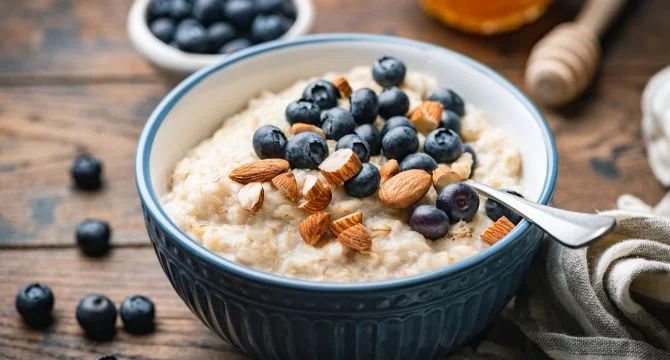The Health Benefits of Oatmeal: A Nutrient-Rich Superfood

Oatmeal Health Benefits
.jpg)
Oatmeal is a popular breakfast choice known for its numerous health benefits. Whether you prefer it in the form of traditional rolled oats, quick oats, steel-cut oats, or overnight oats, here are some of the key health benefits of eating oatmeal:
- Nutrient-Rich Powerhouse: Oatmeal is a nutrient-dense food that provides a wide range of essential vitamins and minerals. A mere half cup of dry, quick-cooking oats contains approximately 150 calories, 5 grams of plant protein, 27 grams of carbohydrates, 4 grams of filling fiber, and a small amount of healthy fats. Additionally, oats are rich in iron, magnesium, zinc, selenium, B vitamins, calcium, and potassium. This nutritional profile makes oatmeal an excellent choice for supporting optimal health.
- Abundance of Antioxidants: Oats contain polyphenol antioxidants known for their anti-inflammatory properties and ability to combat oxidative stress. These antioxidants play a crucial role in protecting the body against aging and various diseases. Studies have linked oatmeal consumption to a reduced risk of heart disease, stroke, type 2 diabetes, and obesity. By incorporating oatmeal into your diet, you can reap the benefits of these powerful antioxidants.
- Oatmeal for Weight Loss: Contrary to popular belief, oatmeal can actually aid in weight management. Research has shown that regular oatmeal consumers tend to have higher scores on the USDA's Healthy Eating Index, indicating a better overall diet quality. The complex carbohydrates present in oatmeal provide sustained energy, promote satiety, and help control cravings, making it an excellent choice for those looking to maintain a healthy weight.
- Whole Grain Goodness: Oatmeal's classification as a whole grain is another reason for its health benefits. Unlike refined grains that have had their bran and germ removed, whole grains like oats retain all their fiber and essential nutrients. This means that by consuming oatmeal, you are not only getting a good source of fiber but also benefiting from vital nutrients that contribute to better overall nutrition and support healthy weight management.
- Enhanced Satiety: Studies have shown that oatmeal has a positive impact on satiety, the feeling of fullness after a meal. Compared to other breakfast options, oatmeal has been found to increase satiety levels and reduce the likelihood of snacking throughout the day. This effect can be attributed to oatmeal's fiber content and its ability to keep you feeling satisfied for longer periods, ultimately supporting healthy eating habits.
- Beta-Glucan Fiber for Optimal Health: Oatmeal contains beta-glucan fiber, which offers a range of health benefits. This fiber type supports healthy immune function, reduces cholesterol and blood sugar levels, and acts as an antioxidant. Beta-glucan has also been linked to the prevention of arterial hardening, neurodegenerative diseases like Alzheimer's, and proper digestive function. By regularly consuming oatmeal, you can harness the protective properties of beta-glucan and promote overall well-being.
- Longevity Boost: Recent research suggests that oatmeal consumption may contribute to a longer and healthier life. A meta-analysis of 33 studies revealed that eating whole grains, including oatmeal, was associated with a lower risk of all causes of death, particularly heart disease. By incorporating oatmeal into your diet, you can potentially reduce the risk of life-threatening conditions and improve your overall longevity.
- Heart Health: Oats are renowned for their heart-healthy properties. The beta-glucans in oats have been shown to lower LDL (bad) cholesterol levels without affecting HDL (good) cholesterol, reducing the risk of heart disease. They also help lower blood pressure, further supporting cardiovascular health.
How much oatmeal should I consume daily to reap its health benefits?
To reap the health benefits of oatmeal, the recommended daily consumption may vary based on individual needs and dietary preferences. However, a general guideline is to aim for at least half a cup (dry measurement) of oats per day, which typically yields around 1 cup of cooked oatmeal. This serving size provides a good balance of essential nutrients, fiber, and antioxidants.
Keep in mind that portion sizes and nutritional needs can differ among individuals, so it's important to consider your specific dietary requirements, activity level, and overall health goals. If you have specific health concerns or dietary restrictions, it's advisable to consult with a healthcare professional or registered dietitian for personalized recommendations.
Additionally, it's worth noting that while oatmeal is a nutritious food, it is also beneficial to incorporate a variety of other whole grains, fruits, vegetables, lean proteins, and healthy fats into your diet for a well-rounded and balanced approach to nutrition.
Remember to prepare your oatmeal in a healthy manner, avoiding excessive sugar and opting for natural sweeteners, such as fresh fruits, nuts, or a drizzle of honey or maple syrup if desired. Experiment with different toppings and mix-ins to add flavor and additional nutrients to your oatmeal, making it a versatile and enjoyable part of your daily diet.
Health Benefits of Eating Oats
Oatmeal is a versatile and nutrient-rich superfood that offers a multitude of health benefits. From its impressive nutrient profile and antioxidant properties to its support for weight management, satiety, and immune function, oatmeal is a valuable addition to a healthy diet. Whether enjoyed as a warm bowl of oatmeal in the morning or incorporated into various recipes throughout the day, oatmeal can provide a delicious and nourishing way to enhance your overall well-being. Embrace the health benefits of oatmeal and savor the goodness it brings to your life.
Post a Comment